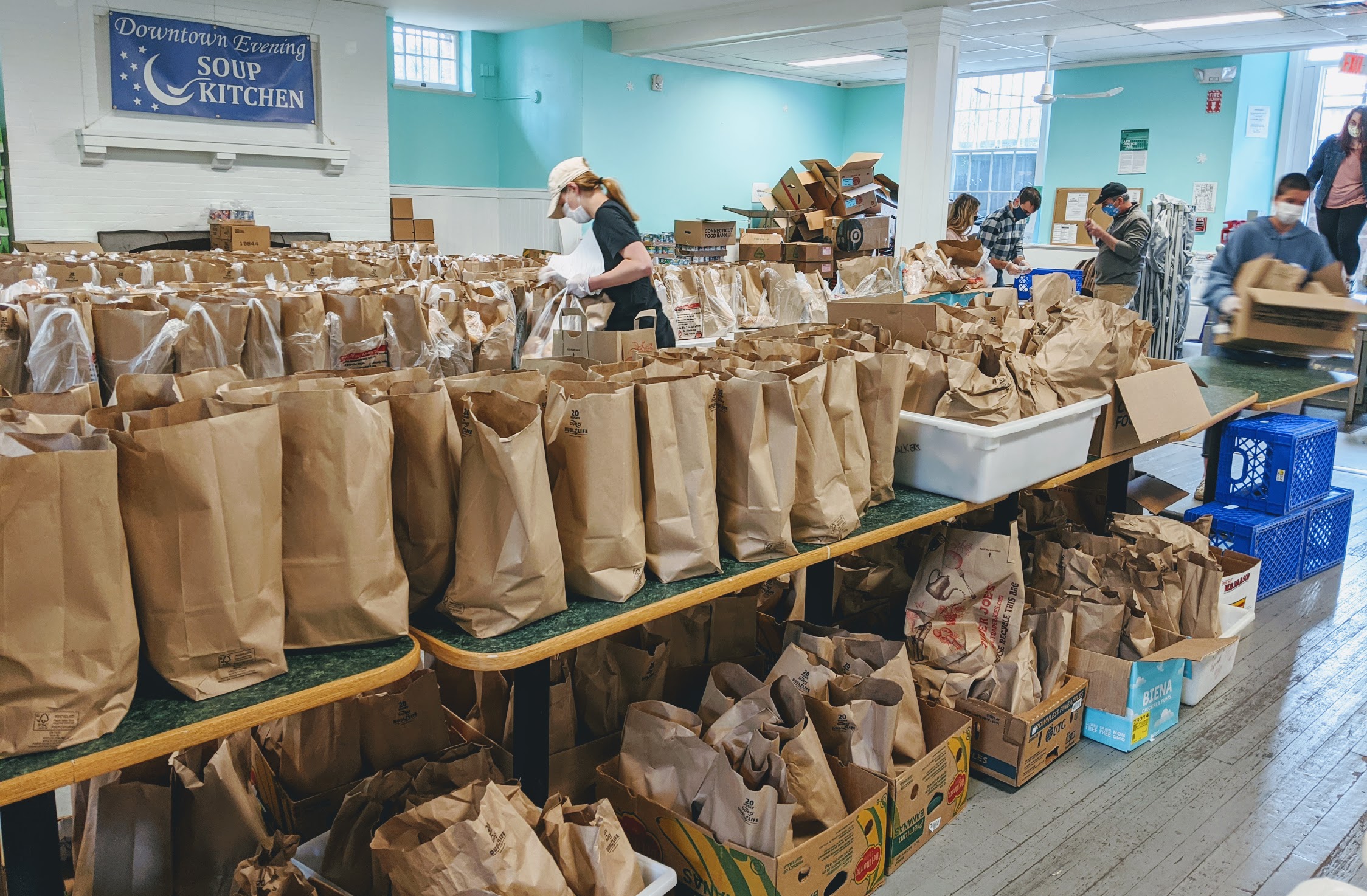Cuts to federal food assistance promise to destabilize New Haven aid network
Budget cuts pouring out of Washington have already begun to empty the pockets of several food aid organizations in a city where one in four residents is food insecure.

Courtesy of Steve Werlin
Food assistance programs in New Haven are scrambling to adjust to a torrent of budget cuts pouring out of Washington — and bracing for more.
In mid-February, U.S. House Republicans proposed a budget resolution ordering $1.4 trillion in federal expenditure cuts. Narrowly passed a week later, it aims to slash $230 billion in agriculture spending by 2034, including emergency assistance funds for the food insecure.
Ongoing negotiations with the Senate — which has passed a very different budget bill of its own — will determine whether the House’s ordered cuts will come into effect. Regardless, the axing of several key programmes by the U.S. Department of Agriculture has already begun to devastate Connecticut organizations that aim to ease food insecurity, according to their executive leadership.
These cuts have also arrived as food insecurity mounts across the nation. An increased one million families became unable to acquire sufficient food from 2022 to 2023, resulting in 13.5 percent of American households classed as food insecure according to a USDA report.
The Local Food Purchase Assistance Cooperative Agreement, or LFPA, for instance, helped local governments purchase nutritious and regionally-specific food from underserved local producers. This produce was then distributed to the surrounding community, bolstering the economic potential of the regional agricultural supply chain while furthering food security.
The LFPA, along with its sister Local Food for Schools program, were axed on March 10 by the USDA.
“[The LFPA] would have enabled us to provide millions of fresh, Connecticut-grown meals to the one in eight Connecticut residents (including one in six children) experiencing food insecurity,” wrote Connecticut Foodshare, a member of the Feeding America network of food banks, in a written statement to the News. Now, that funding is gone.
Funding cuts in early March to other federal programs that the food bank relies on, including The Emergency Food Assistance Program, or TEFAP, have resulted in the cancellation of two trucks of food that would have been provided to the organization’s state-wide partners.
For Connecticut Foodshare, 30 percent of their food inventory relies on federal funding in the form of TEFAP or Commodity Supplemental Food Program, according to the organization’s Chief of Staff Jennie Hirsch. CSFP has not yet been affected by budget cuts.
Food insecurity in New Haven is especially widespread. According to the New Haven Equity Profile published by DataHaven, 27 percent of Elm City households received Supplemental Nutrition Assistance Program, or SNAP, funding in 2021. SNAP benefits are available to low-income households earning less than 130 percent of the federal poverty line — or, in other words, those experiencing acute food insecurity.
This figure was significantly higher for Black and Latino households: 37 percent of Black and 38 percent of Latino households were eligible for support in the New Haven area.
The House budget would cut SNAP funding over the next decade, leaving even more people reliant on a weakened food aid scheme. Though specific policy directives remain unknown, the resolution currently proposes increased work requirements to qualify for the program while reducing the maximum allotment of funding per household over the next decade.
However, according to Connecticut Foodshare, 50 percent of individuals grappling with food insecurity do not even qualify for federal aid. Their only option is to turn to the charitable network — a network which, under the current trajectory of budget cuts, may quickly begin to disintegrate.
“We’ll do our best to adapt to the cuts that will come,” said Mayor Justin Elicker in an interview with the News. “There’s a lot of uncertainty as to what areas will be cut, but we’re focused on having a status quo budget to continue to fund the services that are important to our residents.”
Elicker noted the worrying possibility of the White House reducing funding for free and reduced school lunch programs — a policy the city currently relies on to ensure that all public school children in New Haven are fed — or that the administration may deem undocumented children ineligible to access these resources. If federal funding falls through, Elicker pledged to respond and continue to work with non-profit organizations to support the New Haven community.
The Community Soup Kitchen, which aims to feed the hungry in Elm City, is one such organization. Reliant on food banks like Connecticut Foodshare for its produce, funding cuts have left the prominent soup kitchen similarly destabilized.
“We feed 500 to 600 a day, Monday through Saturday. We’re mostly funded by private donors, but the cutting of our food bank’s money has us running out of [food] that we would normally receive at a discounted [or subsidized rate]. [Now] we have to spend more money to keep our program running,” said Executive Director Winston Sutherland.
Hirsh elaborated that funding cuts have caused an overall reduction in the food bank’s inventory. Its partners, including Community Soup Kitchen, have free access to whatever is available — which is proving to no longer be enough.
Yet the state may soon step in. Connecticut lawmakers have proposed HB 7021 — a bill, which if passed in the state legislature, would fund Connecticut’s Nutrition Assistance Program and reinvigorate the state’s food aid network.
The Connecticut Nutrition Assistance Program comprises the state’s food bank and food stamp expenditures. Currently, Connecticut spends just $1.92 to support each food insecure person. Neighboring states, such as New York and Massachusetts, spend $21.90 and $51.02 respectively.
“[HB 7021] would provide Connecticut Foodshare with enough funds to distribute 22 million additional meals yearly, with 15 percent sourced from Connecticut farmers,” wrote Hirsch.
Connecticut Foodshare works with 650 community-based local partners to serve 44 million meals annually.
Elijah Hurewitz-Ravitch contributed reporting.
Interested in getting more news about New Haven? Join our newsletter!







